An online petition to amend the Criminal Code to ban the Chinese national flag was yesterday rejected by the Ministry of Justice, which said it would infringe on people’s freedom of speech.
The petition, proposed on the National Development Council’s Public Policy Network Participation Platform, seeks to prevent secessionist activities and incitation of aggression by banning the public display of the Chinese flag.
The prevalence of the flag over the past decade has lowered people’s guard against China, which would aid its efforts to annex Taiwan, the petition said.

Photo: Peter Lo, Taipei Times
The petition has gathered more than 5,000 signatures, requiring the Ministry of Justice to formally issue a response.
If hanging the Chinese flag were deemed an act of secession that could draw criminal punishment, it would be an obvious breach of the Constitution, which protects freedom of speech, the ministry said.
Freedom of speech is indispensable for a democracy, as it is a way to achieve self-realization, exchange opinions, guarantee the right to pursue knowledge, form public opinion, and facilitate reasonable political and social activities, the ministry said.
The proposed amendment is disproportionate, as successionism is a political concept that lacks a clear and objective rationale, it said, adding that its definition could be changed by the political climate or the preference of law enforcers.
The reasoning behind the proposal is esoteric and runs counter to the principle that laws should be made as specific as possible, it said.
Existing laws already stipulate punishments for people who attempt to undermine the nation’s system, occupy its territory, illegally change the Constitution or subvert state sovereignty, it added.
If the Criminal Code were amended, it would deny suspects the right to seek judicial relief, as it would be inappropriate for the ministry to deliberate on issues at the constitutional level, such as the nation’s territory, it said.
Alternatively, the punishments would be unlikely to be enforced due to the impracticality of the legislation, it added.
The ministry said it would not accept the petition and has no plans to take further action.

The CIA has a message for Chinese government officials worried about their place in Chinese President Xi Jinping’s (習近平) government: Come work with us. The agency released two Mandarin-language videos on social media on Thursday inviting disgruntled officials to contact the CIA. The recruitment videos posted on YouTube and X racked up more than 5 million views combined in their first day. The outreach comes as CIA Director John Ratcliffe has vowed to boost the agency’s use of intelligence from human sources and its focus on China, which has recently targeted US officials with its own espionage operations. The videos are “aimed at

STEADFAST FRIEND: The bills encourage increased Taiwan-US engagement and address China’s distortion of UN Resolution 2758 to isolate Taiwan internationally The Presidential Office yesterday thanked the US House of Representatives for unanimously passing two Taiwan-related bills highlighting its solid support for Taiwan’s democracy and global participation, and for deepening bilateral relations. One of the bills, the Taiwan Assurance Implementation Act, requires the US Department of State to periodically review its guidelines for engagement with Taiwan, and report to the US Congress on the guidelines and plans to lift self-imposed limitations on US-Taiwan engagement. The other bill is the Taiwan International Solidarity Act, which clarifies that UN Resolution 2758 does not address the issue of the representation of Taiwan or its people in

US Indo-Pacific Commander Admiral Samuel Paparo on Friday expressed concern over the rate at which China is diversifying its military exercises, the Financial Times (FT) reported on Saturday. “The rates of change on the depth and breadth of their exercises is the one non-linear effect that I’ve seen in the last year that wakes me up at night or keeps me up at night,” Paparo was quoted by FT as saying while attending the annual Sedona Forum at the McCain Institute in Arizona. Paparo also expressed concern over the speed with which China was expanding its military. While the US

SHIFT: Taiwan’s better-than-expected first-quarter GDP and signs of weakness in the US have driven global capital back to emerging markets, the central bank head said The central bank yesterday blamed market speculation for the steep rise in the local currency, and urged exporters and financial institutions to stay calm and stop panic sell-offs to avoid hurting their own profitability. The nation’s top monetary policymaker said that it would step in, if necessary, to maintain order and stability in the foreign exchange market. The remarks came as the NT dollar yesterday closed up NT$0.919 to NT$30.145 against the US dollar in Taipei trading, after rising as high as NT$29.59 in intraday trading. The local currency has surged 5.85 percent against the greenback over the past two sessions, central